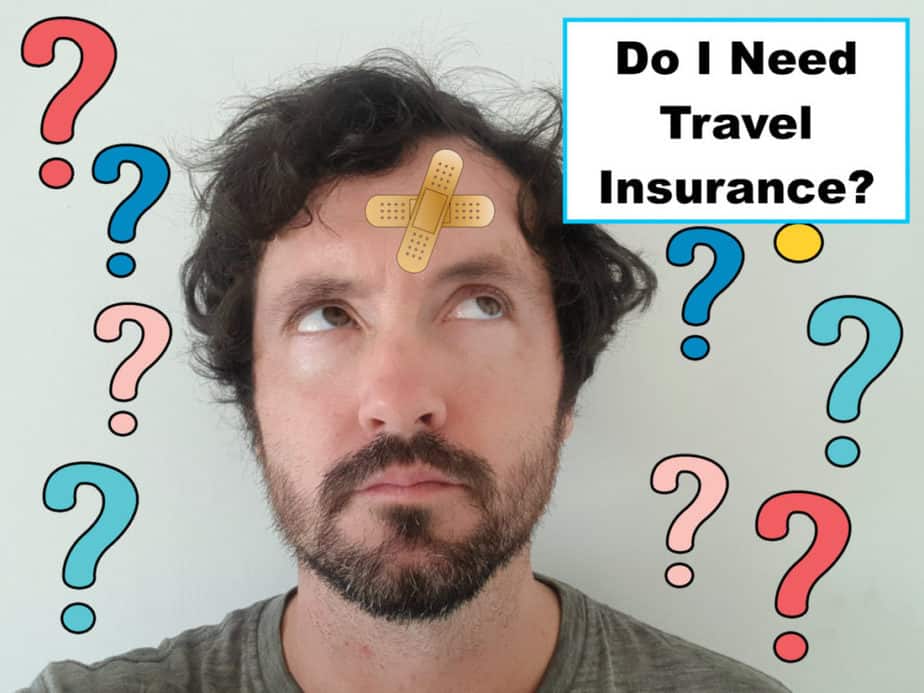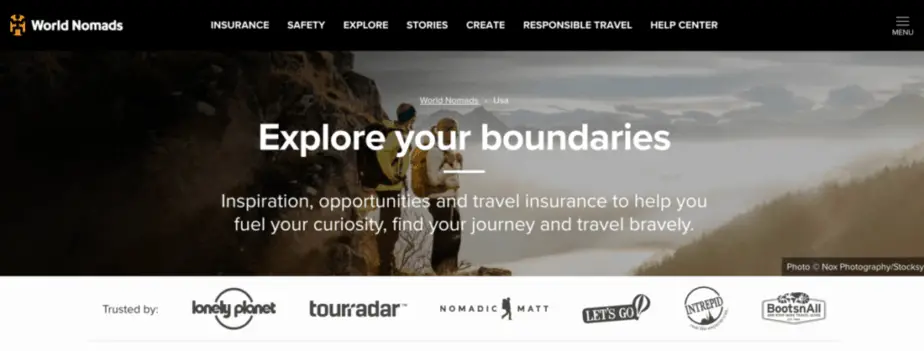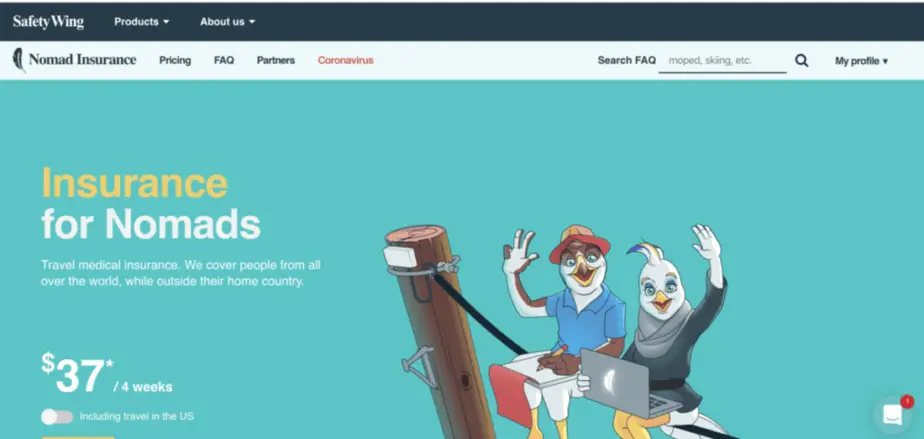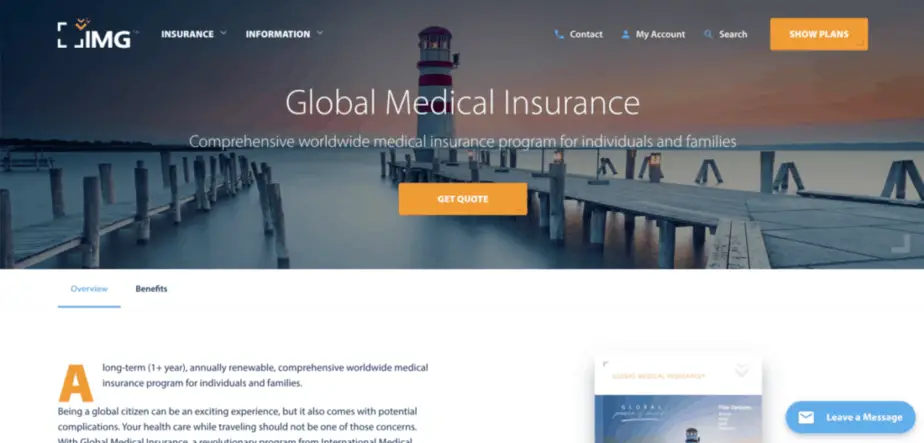When I was planning my trip to India, I was broke, in debt, and trying to pinch every penny I could. Therefore, I seriously considered whether to buy travel insurance for India or not, so I spent hours researching whether I needed traveling insurance for India and found out…
On a trip to India, you should buy as much travel insurance as you can afford, and AT LEAST get Emergency Medical and Evacuation Coverage and COVID-19 Coverage. If you have a significant amount of pre-paid expenses like tour reservations, then you should get Trip Cancellation Insurance too.
Most articles on this topic are basically lists of why you NEED travel insurance because it is smart to get as much coverage as possible and budget travel insurance into your trip.
When I flew to India, I bought extensive travel insurance and it has helped me sleep well at night and travel around with confidence.
However, after living and traveling around India since 2018, I’m researching how to reduce my insurance coverage. I no longer need trip cancellation or interruption coverage.
As I’ve read through long insurance policies, I’ve learned some things that could be very helpful if you are planning a trip and considering getting travel insurance for India… or any country in the world.
What Questions Should You Consider When Buying Travel Insurance?

What Types of Insurance Do You Currently Have?
You might be able to reduce your travel insurance or skip it altogether if you already have insurance. Check your health insurance, homeowners or renters insurance, and credit cards to see what sort of coverage you currently have.
Health Insurance
What type of health insurance do you already have in your home country? In the USA, almost every policy will NOT cover you when you leave the country. Or you’d need to be within a number of miles, for example, less than 100 miles away.
This is the case in most other countries as well, BUT if your health insurance already provides international coverage, then you might NOT need travel insurance.
It is rare for health insurance to cover international travel though. Almost everyone reading this post though, will NOT be covered by their primary health insurance and should consider buying additional travel insurance to cover you.
Homeowners or Renters Insurance
Homeowners or renters insurance often covers your possessions even while you are traveling. You would just have to consider your deductible (which means how much you have to pay before the insurance company starts chipping in).
Deductibles vary widely but are usually between $250 to $2,500. So if my MacBook was stolen (worth $1500) and my deductible was $2000, then I wouldn’t get any money from my company. However, if I had a lower deductible of $250, then I would get $1250 to replace it.
For instance, I had renters insurance and it provided cover for up to $10,000 on my possessions. However, high-risk items like electronics and jewelry were only covered for $2,500.
Read through your policy for details, but this could go a long way towards protecting your gear as you travel!
Credit Cards With Travel Insurance
Many credit cards have insurance, which can protect you in some situations. I did some research on popular credit cards with travel insurance, so you can find the details below:
| Credit Card | Medical Evaluation & Treatment | Baggage Delay | Lost Luggage | Trip Delay | Trip Cancellation/Interruption | Travel Accident | Rental Car | Extras |
| Delta SkyMiles® Gold American Express Card | Up to $3.5 million | None | Up to $1,250 | None | None | None | Up to $50,000 | N/A |
| Chase Sapphire Reserve® Card | Up to $2,500 if you’re more than 100 miles from home when you or a family member gets sick or injured (*includes dental) | N/A | N/A | Up to $500 per ticket (if the delay is +6 hours) | Up to $10,000 per person and $20,000 per trip | Up to $1,000,000 | Up to $75,000 | Roadside assistance up to $50 per incident 4 times a year |
| Chase Sapphire Preferred® Card | N/A | Up to $100 per day for five days (if the delay is +6 hours) | Up to $3,000 per person | Up to $500 per ticket (if the delay is +12 hours) | Up to $10,000 per person and $20,000 per trip | Up to $500,000 | Up to the current value of the car | N/A |
| United℠ Explorer Card | N/A | Up to $100 per day for three days | Up to $3,000 per passenger | Up to $500 per ticket for delays more than 12 hours | Up to $1,500 per person and $6,000 per trip | Up to $500,000 | Covers damage or theft with restrictions | N/A |
| Marriott Bonvoy Boundless™ Credit Card | N/A | Up to $100 per day for five days | Up to $3,000 per passenger | Up to $500 per ticket for delays more than 12 hours | N/A | N/A | N/A | N/A |
| Marriott Bonvoy Brilliant American Express Card | N/A | N/A | Up to $2,000 for checked bag and up to $3,000 for checked and carry-on bag. | N/A | Up to $500,000 | Up to $75,000 | N/A | |
| Southwest Rapid Rewards® Plus Credit Card | N/A | Up to $100 per day for three days | Up to $3,000 per passenger | N/A | N/A | Up to $250,000 to $500,000 (Visa Platinum and Visa Signature, respectively). | Up to actual cash value of vehicle | N/A |
| Capital One® Venture® Rewards Credit Card | N/A | N/A | Up to $3,000 per passenger | N/A | N/A | Up to $250,000 | Covers damage or theft with restrictions | N/A |
| Capital One QuicksilverOne Cash Rewards Credit Card | N/A | N/A | N/A | N/A | N/A | $100,000 | Up to the actual cash value of the car | N/A |
| Hilton Honors American Express Aspire | N/A | Up to $100 per carrier for three days | Up to $3,000 per passenger | N/A | N/A | Up to $500,000 | Up to $75,000 | N/A |
| The Platinum Card® from American Express | N/A | N/A | Up to $3,000 per passenger ($2,000 for a checked bag & $1,000 for jewelry & electronics) | N/A | N/A | Up to $500,000 | Up to $75,000 | N/A |
| United℠ Explorer Card | N/A | Up to $100 per day for three days | Up to $3,000 per passenger. | Up to $500 per ticket for delays more than 12 hours | Up to $1,500 per person and $6,000 per trip | Up to $500,000 | Covers damage or theft with restrictions | N/A |
| Wells Fargo Propel American Express® Card | N/A | N/A | Up to $1,000 | N/A | N/A | Up to $150,000 in coverage | Up to $50,000 | N/A |
***NOTE: Be sure to check your credit card’s current terms and conditions.
What Specific Types of Coverage Does Travel Insurance Provide?
Travel insurance is a general term covering many different specific types of coverage:
- Trip Cancellation: This covers pre-paid expenses if you have to cancel your trip before departure. This the most common type of insurance people get for a trip. It is also the most inexpensive. For more read my post: Should you get trip cancellation insurance or not?
- Trip Interruption: This covers pre-paid expenses if you have to cancel your trip after you have departed.
- Baggage Delay: If your bag is lost by the airline, this insurance will pay you every day your baggage is delayed, usually more than 6, 12, or 24 hours. It will help you buy new clothes or gear as you wait.
- Lost Luggage: If the airline loses your luggage, then you can get paid to buy new items.
- Emergency Medical: If you get sick or injured in your destination country, then you can get paid for your medical expenses.
- Medical Evacuation & Repatriation: If the local medical treatments will NOT cover you, then this will pay to fly you back to your home country for treatment. If the unthinkable happens, repatriation would cover flying your remains back to your home.
- Accidental Death & Dismemberment: This is a type of life insurance that would pay benefits to your family if something terrible happens.
- Gear Protection: If your stuff gets lost or damaged, then you would get a refund.
What’s The Most Common Way To Save Money on Travel Insurance?
One of the most expensive types of travel coverage is trip cancellation insurance, and for some people you can save money by NOT getting it.
Here’s how:
Figure Out Your Pre-Paid Expenses
The more pre-paid expenses you have, the more incentive you have to buy trip cancellation insurance.
Let’s say you have a lot of pre-paid expenses like $2500.
- Flight: $1300
- Retreat: $500
- Hotels: $200
- Tour: $500
If you’re paying $2500 in expenses before you leave, then it makes sense to buy trip cancellation insurance. If you were to get sick and had to cancel, that’s a lot of money to lose.
On the other hand, if you’re a budget backpacker you might only pay probably only pay $1000 upfront.
- Flights: $1000
- Hotels: $0
- Tour: $0
- Retreat: $0
If you’re only paying $1000 before you leave, you may think twice about paying extra for trip cancelation insurance.
HOTEL BOOKING TIP: One way to reduce prepaid expenses is by using a company like Booking.com. You can book your hotels months in advance without putting any money down. I usually book a couple of hotels at first as I research and then cancel.
Figure Out How Much Your Gear Is Worth
Protecting your gear can be expensive, and it can be difficult to get paid for these claims. You’d need to make sure your policy covers your specific gear (for instance, some laptops, jewelry, and expensive cameras are NOT covered unless you purchase specific insurance). You’d also want to make sure you have receipts and photos of yourself using the gear on your trip so you have proof that you took it with you.
When you’re deciding how much insurance to buy make a list of what gear you have. And ask yourself, could you absorb losing it all?
For instance, if you’re a travel blogger and have:
- An expensive computer – $2000
- A nice DSLR camera with lenses and accessories – $1500
- An action camera – $500
- Clothes and stuff – $500
- Total gear = $4500
Or maybe you’re a minimalist spiritual seeker and only have:
- Clothes and stuff: $500
Obviously losing $4500 is going to hurt a lot more than $500, so it makes more sense to get more coverage then.
Factor In How Long Your Trip Is
If you’re going on a two week or month-long trip, then your insurance needs will be less than if you are traveling for 6 months… or years like myself.
For a two week trip, you should keep your primary health insurance coverage in your home country.
If you’re going on a six-month trip like I did, then getting primary health insurance becomes more complicated. For example, I’m not going to be paying $350 a month to keep my US-based health insurance because it would not even help me if I was injured overseas.
See below if you are traveling long-term as well, I share the international health insurance I use… but for most travelers, some extra medical coverage is all you need.
How Expensive Is Medical Coverage in India or the Country You Are Traveling To?

Medical expenses in India are super reasonable, in fact, medical tourism is the most common reason people give for visiting Tamil Nadu where I am staying.
My friend had dental work done (9 porcelain crowns) and only paid $70 for each. He also got a partial denture to replace 5 teeth for $346. For comparison, in the US, I only needed 3 porcelain crowns and I paid over $3000 for them. That’s almost 10 times cheaper!
The care you receive at doctors and hospitals may NOT be as high-quality as in the USA or your home country, but there are many great hospitals and doctors in India.
So for some travelers, they may decide to risk it and pay out of pocket if they got hurt in India… versus paying every month for insurance (although I can show you an inexpensive option that may be very helpful).
For most travelers, I recommend emergency medical and evacuation coverage as well as coverage for COVID-19, but on a trip to India I wouldn’t invest the money in the best plan.
If you were looking at travel insurance in Europe, you would need medical insurance because it is required. Or if you were to get a Schengen Visa then you would be required to get travel insurance.
What Type Of Exclusions Do Most Travel Insurance Policies Have?
It’s important to keep in mind that buying extra travel insurance does NOT guarantee you will get a 100% refund of all your trip expenses.
Keep in mind insurance companies make you sign a long hard-to-understand contract to protect themselves as well, and maybe NOT pay you.
Here are some common exclusions to look for in your policy that are NOT covered:
- Pre-existing medical conditions
- Injuries due to drug or alcohol abuse
- Adventurous or dangerous activities like scuba diving or rock climbing
- Scooter accidents if you do not have an international drivers license or aren’t wearing a helmet
- If your stuff is stolen from an unlocked car, in plain sight, or unattended
- Terrorism or civil unrest, but the government hasn’t called for an evacuation
- Global pandemics like COVID-19
- If you ignored travel advisories
- If you just want to go home
- If you break up with your travel partner and don’t want to travel with them anymore
- If you lose your job and can’t afford the trip anymore
- General preventative medical checkups
Three Travel Scenarios With Recommended Insurance Coverage
Let’s take a look at three different types of travelers and which types of travel insurance would be best for them:
- Adventurous Travelers
- Travelers Looking To Save Money
- Long-Term Travelers
Most Extensive Coverage for Adventurous Travelers: World Nomads

World Nomads is recommended by the Lonely Planet, Eurail, and other respected travel companies for a number of good reasons.
- They cover more adventurous activities than other companies
- You can renew your coverage after your flight or while you are traveling
- You can get covered in a few minutes
I chose World Nomads for all of these reasons and every 6 months I have happily renewed my policy. What I love about World Nomads is that even the Standard policy covers adventurous activities such as scuba diving, hiking, moped riding, and of course, polar plunges 😉
Here’s an example of the coverage for a US Citizen under 40, traveling to India for 2 weeks in 6 weeks. *Your situation and quote will be different but this will give you an idea of what to expect:
| Emergency Accident & Sickness Medical Expense | $100,000 | $100,000 |
| Emergency Evacuation & Repatriation | $300,000 | $500,000 |
| Non-Medical Emergency Transportation | $25,000 | $25,000 |
| Trip Cancellation & Interruption | $2,500 | $10,000 |
| Trip Delay | $500 | $1,500 |
| Baggage and Personal Effects | $1,000 | $3,000 |
| Baggage Delay | $750 | $750 |
| Rental Car Damage | Not included | $35,000 |
| Accidental Death & Dismemberment | $5,000 | $10,000 |
| 24-hour Assistance | Unlimited | Unlimited |
| Adventure Activities | Check here for an updated list | Check here for an updated list |
| Total cost | $78 | $141 |
Good Coverage with the Lowest Price: SafetyWing Travel Medical Insurance

For some travelers, they won’t need that much coverage though. For instance, you may NOT want to buy trip cancellation insurance.
If this sounds like you, SafetyWing is a new company getting great reviews that has good coverage at a great price.
You can get a personalized quote here:
If you just want the most important coverage which is emergency medical and emergency evacuation, then SafetyWing is your best option.
I am thinking of switching my policy since I no longer need trip cancellation, trip interruption insurance, lost luggage, baggage delay, and more.
For the same, US Citizen under 40 traveling for 2 weeks in 6 weeks in advance:
| Hospital | Room and Nursing Services |
| Intensive Care | Up to $100,000 |
| Ambulance | Reasonable charges when covered illness or injury results in hospitalization |
| Urgent Care | $50 co-payment, not subject to deductible |
| Physical therapy and chiropractic care | Up to $50 per day. Must be ordered by a physician in advance |
| Emergency dental | Up to $1,000, not subject to deductible |
| All other Medical Expenses | Up to the overall maximum limit of $100,000 |
| Trip Interruption | Up to $5,000, not subject to deductible |
| Trip Cancellation | Not covered |
| Travel Delay | Up to $100 a day after a 12-hour delay period requiring an unplanned overnight stay. Subject to a maximum of 2 days. No deductible |
| Lost Checked Luggage* | Up to $3,000 per certificate period; $500 per item. Up to $6,000 lifetime limit. No deductible. Notable exclusions are: Electronics such as phones, laptops, cameras are not covered. *$250,000 maximum benefit any one family or group. Not subject to deductible or overall maximum limit |
| Natural Disaster | If you need a new place to stay, up to $100 a day for 5 days. No deductible |
| Political evacuation | Up to $10,000 lifetime maximum. Not subject to deductible |
| Emergency medical evacuation | Up to $100,000 lifetime maximum. Not subject to deductible or overall maximum limit. |
| Personal Liability – Lifetime Maximum | $25,000, not subject to deductible or overall maximum limit |
| Personal Liability – Third Person Injury | $25,000, not subject to deductible or overall maximum limit |
| Personal Liability – Third Person Property | $25,000, not subject to deductible or overall maximum limit |
| Personal Liability – Related third person property | $2,500, not subject to deductible or overall maximum limit |
| Accidental death & dismemberment (AD&D) – Loss of 1 Limb | $25,000. $250,000 maximum benefit any one family or group. Not subject to deductible or overall maximum limit. |
| Accidental death & dismemberment (AD&D) – Loss of 2 Limbs | $50,000. $250,000 maximum benefit any one family or group. Not subject to deductible or overall maximum limit. |
| Accidental death & dismemberment (AD&D) – Lifetime Maximum | $50,000. $250,000 maximum benefit any one family or group. Not subject to deductible or overall maximum limit. |
| Accidental death & dismemberment (AD&D) – Death | $50,000. $250,000 maximum benefit any one family or group. Not subject to deductible or overall maximum limit. |
Long-Term International Health Insurance: IMGlobal Medical

For most travelers, the options above are your two best choices. If you’re going to be staying in India or another country for longer than a few months though, you will want to consider getting international health insurance.
Why should you consider this? If you only get World Nomads or SafetyWing, you would NOT be covered if you were evacuated back to your home country. So if I had to be flown back to the USA for treatment I would have NO COVERAGE as soon as I reached the US and would have to foot the rest of the bill on my own.
If you’re a US Citizen as well, then you have heard horror stories of someone being bankrupted or losing their life savings because of medical expenses.
Getting international health insurance would mean you are covered in your home country AND in other countries.
Now if you live in Canada or some places in Europe where you have primary health insurance provided by your government, then this insurance is NOT necessary. In fact, it’s most expensive if you are a US citizen. 🙁
After doing my research, IMGlobal Medical Insurance looks like the best option for me.
There’s a lot to this insurance so I won’t bore you with all of the details but you get:
| Bronze | Silver | Gold | Platinum | |
| Lifetime Maximum | $1,000,000 per individual | $5,000,000 per individual | $5,000,000 per individual | $8,000,000 per individual |
| Deductible | $250 to $10,000 | $250 to $10,000 | $250 to $25,000 | $100 to $25,000 |
| Emergency Evacuation | $50,000 maximum per period of coverage. Not subject to deductible or coinsurance. | $50,000 maximum per period of coverage. Not subject to deductible or coinsurance. | Up to maximum limit. Not subject to deductible or coinsurance. | Up to maximum limit. Not subject to deductible or coinsurance. |
This is primary health insurance though so it doesn’t have coverage for trip cancellation or lost items. If I wanted to add that then I would add SafetyWing or World Nomads.
Related Questions:
What’s The Best Travel Insurance for India?
World Nomads has the most extensive coverage for adventurous activities such as hiking, scuba diving, rock climbing, and even weird stuff like polar plunges.
SafetyWing has good coverage for the basics such as trip interruption, emergency medical evacuation, travel delay, lost luggage, and offers a monthly payment option with the best prices.
Is Travel Insurance Mandatory for India?
For some work or volunteering opportunities and even some tours, travel insurance is mandatory. The Indian government does NOT require you to have travel insurance for your visa or for entry though.
Can I Buy Travel Insurance After My Trip Starts?
Most travel insurance companies require you to purchase the insurance before you leave for your trip. World Nomads and SafetyWing let you buy insurance at any time or renew while you are traveling.

